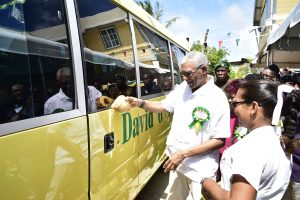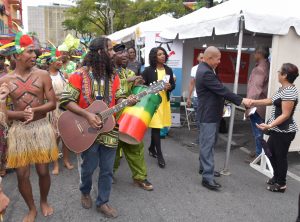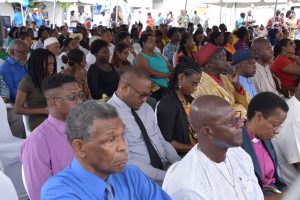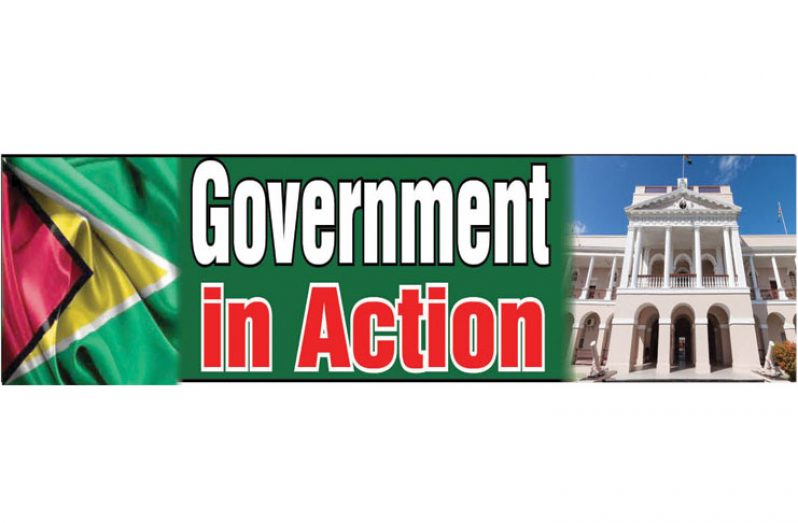
Social Cohesion could be described as the willingness of all sections of society to work together to create a sense of belonging and to ensure every person has equal access to resources, in an effort to realise a good life for all. Equity in the delivery of public services and access to the country’s resources is a part of the process of achieving social cohesion and this continues to be a key focus of the current administration, with Government emphasising empowerment, equality, employment, access to social services and education as the key means of ensuring the good life for all Guyanese.
From the recent re-establishment of the Ethnic Relations Commission (ERC), to the revival of local democracy through Local Government elections, which allows citizens to take the lead in the decision making process within their communities, to the introduction of several initiatives that encourage education and entrepreneurship, to the completion of several infrastructural projects aimed at equitably improving the lives of citizens across the country, regardless of ethnicity, geographic location, gender, political affiliation or sexual orientation, this administration continues to work to ensure that every Guyanese has an equal stake in the nation’s development.
It was upon the longing of a nation to eschew divisions for once and for all and the need for national unity, harmony and a unified destiny that the coalition Government was founded. Since its assumption of office, a critical area of focus for the government has been building a socially cohesive society where every Guyanese has a sense of belonging. The pursuit of national unity and inclusivity gave birth to the Department of Social Cohesion, housed in the Ministry of the Presidency, which is dedicated to changing the social landscape of Guyana.
President David Granger understands only too well the history of Guyana, which has resulted in certain social, ethnic, religious and political constructs, which have been used to create divisions among the six peoples of this country. At the launch of the Ministry of Social Cohesion’s Strategic Plan for 2017-2021, at the Marriott Hotel on March 17, 2017, the Head of State said that social cohesion is the thread that will bring the various groups together in pursuance of national development.
“We believe that there is a way to harmonise relations and to reduce conflict among social groups. We believe that social cohesion is the thread that will bind these various groups together. Guyana, today, still needs to stanch the sort of social erosion that degenerated into civil violence of the ‘Troubles’ in the recent past. We still see how easily the ranting of a few rancorous persons can rekindle racial animosity, a retrograde step, which has no place in modern society… Our nation has been scarred by violence, which left a lingering legacy of distrust with the threat of disorder… We have to work together to repair that damage, restore trust and rebuild the bases of a ‘moral community’ which enable us to trust each other,” he said.
Harmony Village

The Department of Social Cohesion on Thursday last hosted its second annual ‘Harmony Village’, an event aimed at promoting Guyana’s racial and cultural diversity with over 100 exhibitors, which Coordinator of the Department, Ms. Sharon Patterson says is a testimony of the groundwork, community and stakeholder engagements that the Ministry has been undertaking over the last year.
The event, which was held under the theme, “Building Partnerships: Promoting Community and National Cohesion saw the showcasing of cultural performances, food, art and craft and cultural wear, among other displays. In his address to the gathering, Minister of Social Cohesion, Dr. George Norton said that it is events like these that will help to promote exposure to the various cultures, which will in turn help to build tolerance and respect.
“We all are Guyanese; proud and patriotic. I do firmly believe that unity does not necessarily lie in uniformity. Unity is all about variety… We deserve to be exposed to different perspectives and ways of life… We must understand and respect the belief and customs of our fellow brothers and sisters. If we all are to look the same, if we should have the same thoughts, the same knowledge and beliefs, then we would all be guilty of being narrow-minded and that will rob us of our growth and fulfilment and reduce our curiosity as a people… For us to become truly united… we must first be cognizant and fully comfortable and aware of who we are as individuals. The key to us embracing diversity and promoting tolerance is to be proud of ourselves, our culture… traditions, ethnicities, religions, and all the things that make us who we are as individuals. Let us celebrate ourselves and those who came before us, for we all are one people living in one nation, treading on one destiny,” he said.

Ms. Patterson noted that the Ministry does not see the event as a one-off activity, but rather one, which seeks to bring all stakeholders together in an effort to boost networking, appreciation and respect for each other’s backgrounds as the Ministry seeks to bridge the dividing gaps. “Harmony Village is designed to bring a myriad of stakeholders together to co-exist in a small space to share their differences and give each other an opportunity to respect our differences. It is an opportunity for networking because beyond Harmony Village, we like to ensure our stakeholders have an opportunity to meet and strengthen partnerships,” Ms. Patterson said.
In his 2018 Budget presentation, Minister of Finance, Mr. Winston Jordan said that the Government is resolute in its commitment to creating a harmonious society, based on the principles of mutual respect and tolerance for one another, regardless of age, gender, race, religion or sexuality.
“Admittedly, this is a mammoth task, given the distrust that has been sown among brothers and sisters of our Nation or the lack of tolerance for persons who are seen as being different. We will not let such divisions and intolerance continue to hinder our development. The Government will continue to work to rebuild trust and cohesiveness in our society. In 2018, we will continue to engage civil society groups and local and central Government agencies, through our sensitisation and information sharing initiative, to ensure that they are aware of their roles in achieving social cohesion,” he said.
The Ethnic Relations Commission
Critical to the achievement of social cohesion and a harmonious society is the Ethnic Relations Commission. In January 2018, after six years of not being in operation, the National Assembly approved the appointment of Mr. Barrington Braithwaite, Ms. Ruth Howard, Mr. Roshan Khan, Major General (Ret’d) Norman McLean, Pandit Deodat Persaud, Mr. Ashton Simon, Ms. Rajkumarie Singh, Bishop John Smith, Mr. Neaz Subhan and Mr. Norris Witter as members of the Commission.
On February 22, President Granger swore-in the 10 members to the ERC, urging them to discharge their duties without cowardice, malice and prejudice. He reminded that Constitutional Service Commissions are enshrined, established and empowered by the Constitution and noted that they serve to insulate citizens and institutions against influence and interference by the Executive. “The ERC is intended, inter alia, to promote good relations, harmony, peace, tolerance and understanding between our peoples; provide equal opportunity between persons of different ethnic groups, and proscribe ethnic discrimination,” he said on that occasion.
Mr. Roshan Khan, in a brief comment just after being sworn in, said that the ERC will endeavour to create national cohesion and goodwill amongst the various religious faiths and the ethnic groups. “Once you become a member of the Commission, insularity ends. You become a person working for national ethos, national goodwill,” he said.
Similar sentiments were expressed by Pandit Persaud, who is representing the youth constituency on the ERC. He said, “As a person who comes from the background of fairness, transparency and impartiality, these are the things I will use as the benchmark in the execution of my functions… At the end of the day, this is our country and everyone must get a piece of the pie. There must always be fairness. People must …not feel discriminated.”
Equal access to education
President Granger has set as a primary policy position that requirement that every child must have access to a quality education as it is through education that poverty can be overcome. The President’s Every Child in School policy guides education delivery and his push toward ensuring equal access to education is clearly seen through his flagship Boats, Buses, Bicycles plus Breakfast and Books (Five B’s) Initiative and the National Endowment for Science and Technology (NEST).
These two initiatives of the President are complimented by the First Lady, Mrs. Sandra Granger’s ‘Shoes that grow’ programme, which is aimed at providing footwear to students, particularly in the hinterland areas. The First Lady has also spearheaded the Buxton Information and Communication Technology (ICT) workshop, the Buxton Youth Development remedial programme and the Lusignan Youth Development Initiative (LYDI) remedial programme, which are held under the auspices of the Office of the First Lady.
The ICT workshop is certified by the Board of Industrial Training (BIT) and equips graduates with basic ICT skills. These students, in the past, would be required to walk to and from school barefooted. Over 5000 students have benefitted from that initiative.
At the handing over of three buses at the Durban Park in August 2017 to Georgetown to serve the students of the North and South areas of Georgetown of , the Head of State said that the Government is committed to ensuring that every Guyanese child has access to an education as it is only through education that they can gain employment and become empowered and enjoy an equal stake in the resources of the nation.
“We see education as the gateway to the good life. We see that by providing these buses, boats and bicycles that we will improve access to schools; we will improve attendance and in so doing, we see improved achievement. We want to see ‘A’ students and those are the ‘A’s we are working towards today [access, attendance and achievement]. We have made transportation easier for children and we want to create an equal society so that the children in Mabaruma, Jawalla and Aishalton would have an equal opportunity to education as the children in Sophia, Industry or Cummings Lodge,” he said.
The President noted that investment in a child’s education is an investment in a nation and it is up to the Government and all other stakeholders to ensure that they are equipped and provided with equal opportunities, which can help them to create a bright future for themselves, their families and their country. The Head of State said that the buses will not just be transporting school children, but the future engineers, scientists, entrepreneurs and pioneers who will take Guyana forward in the years to come.
Out of school youth across Guyana are also benefiting from a number of initiatives aimed and empowering them to improve their own livelihoods and contribute to nation building. On January 1, 2018, the Guyana National Youth Corps, an organisation, which seeks to provide employment and other opportunities for youth, particularly those, who have dropped out of school, was re-established. The President has urged parents, teachers, community leaders and civil society bodies to assist the Government in identifying youth, who are in need of jobs, particularly those who may not have completed school so that they can be enrolled in the Youth Corps. The Head of State believes education is the ultimate equaliser and this forms the basis of programmes designed to qualify in and out of school youth with the necessary skills to ensure their gainful employment.
The Government has also pushed entrepreneurship as the key toward generating wealth and ensuring that people are able to provide an income for themselves using skills and resources that are available to them. Government’s push toward entrepreneurship can be seen in the establishment of initiatives such as the Sustainable Livelihood and Entrepreneurial Development (SLED) Initiative; the Hinterland Employment and Youth Service (HEYS) Programme; and the Linden Enterprise Network (LEN). These programmes, since their establishment, have sought to equip young people with the requisite skills, knowledge and finance needed to become entrepreneurs.
Infrastructural Development
While resources are limited, the Government has committed itself to improving the infrastructural landscape of the country. Decisions on infrastructural development work are not based on perceived political affiliation in various communities but on Government’s policy aimed at linking the Hinterland to the Coastland and the development of a work class road and bridge network to spur economic activity.
In order for residents to function effectively in their communities, it is important that each community is equipped with basic services. These services include the required infrastructure to provide ease of access to and from the communities as well as access to health, education and other facilities that aid in improving one’s quality of living. In the three years since this administration has taken up Office, millions of dollars have been plugged into infrastructural development with an aim to provide equal access, particularly in previously overlooked areas.
The President has said that ensuring that residents have access to these facilities is part of ensuring that Guyanese enjoy the good life.
“We do not believe that your roads should be inferior, [that] your transportation should be inferior, that your schools should be inferior. That is why we are spending millions of dollars on sea defence and improving transportation on this island so that you must be able to move about so that you must be able to get your paddy from the farms. You must be able to sell your produce in other parts of the island, the Region and the country. And we will continue working for you because every Guyanese is entitled to equal access to education, equal access to employment, equal access to good infrastructure,” he said.
As the Government bolsters its effort to bridge the gap between the hinterland and the coastland, it announced in the 2018 National Budget that the terms of reference for the design and feasibility of the Linden-Mabura Road Upgrade, the River Crossing at Kurupukari, and the Coastal River and Infrastructure Project have been granted approval while $250 million has been set aside to improve airstrips and aerodromes across the country, of which $140 million will be used to commence the rehabilitation of airstrips at Bemichi and Kamana. Another 12 airstrips across the hinterland regions will be rehabilitated at a cost of $110.3 million. Government is also in negotiation with a multilateral donor to secure a US$15 million loan, to finance a project for further aerodrome and airstrip development across the hinterland. Under that programme, the Lethem airstrip will be upgraded into a regional hub and international aerodrome, in order to receive flights originating from Brazil and other Latin American neighbours.
In addition to this, social services such as health, water, electricity, citizenship services, and others are being decentralised to ensure that citizens can access these right in their own regions.
The tenets of equity, equal access, education, entrepreneurship, infrastructural development and access to services are all interlinked and relevant to the concept of social cohesion and therefore remain a constant in the President’s message. The Head of State believes that once these practices are adopted, the country will be well on its way toward becoming a nation where every citizen can indeed enjoy the good life in keeping with the country’s motto: “One people, One nation, One destiny.”



.jpg)








